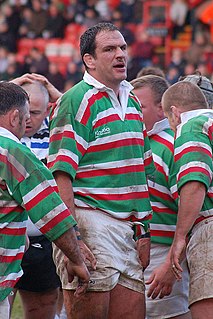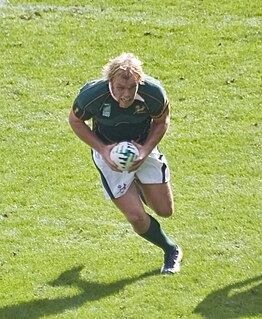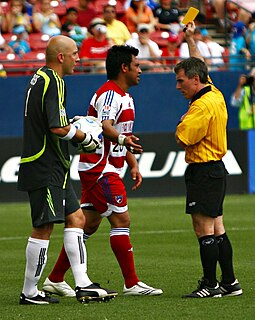Related Research Articles

A football player or footballer is a sportsperson who plays one of the different types of football. The main types of football are association football, American football, Canadian football, Australian rules football, Gaelic football, rugby league and rugby union.

Martin Osborne Johnson CBE is an English retired rugby union player who represented and captained England and Leicester in a career spanning 16 seasons. He captained England to victory in the 2003 Rugby World Cup, and is regarded as one of the greatest locks ever to have played, and one of England's greatest ever players.

A concussion, also known as a mild traumatic brain injury (mTBI), is a head injury that temporarily affects brain functioning. Symptoms may include loss of consciousness (LOC); memory loss; headaches; difficulty with thinking, concentration or balance; nausea; blurred vision; sleep disturbances; and mood changes. Any of these symptoms may begin immediately, or appear days after the injury. Concussion should be suspected if a person indirectly or directly hits their head and experiences any of the symptoms of concussion. It is not unusual for symptoms to last 2 weeks in adults and 4 weeks in children. Fewer than 10% of sports-related concussions among children are associated with loss of consciousness.

Harlequins is a professional rugby union club that plays in Premiership Rugby, the top level of English rugby union. Their home ground is the Twickenham Stoop, located in Twickenham, south-west London.
A rugby league team consists of thirteen players on the field, with 4 substitutes on the bench. Each of the thirteen players is assigned a position, normally with a standardised number, which reflects their role in attack and defence, although players can take up any position at any time.

Schalk Willem Petrus Burger Jr. is a former South African professional rugby union player. He played as a flanker for Saracens in the English Premiership and has won 86 caps for South Africa.

Penalty cards are used in many sports as a means of warning, reprimanding or penalising a player, coach or team official. Penalty cards are most commonly used by referees or umpires to indicate that a player has committed an offence. The official will hold the card above their head while looking or pointing towards the player that has committed the offence. This action makes the decision clear to all players, as well as spectators and other officials in a manner that is language-neutral. The colour or shape of the card used by the official indicates the type or seriousness of the offence and the level of punishment that is to be applied. Yellow and red cards are the most common, typically indicating, respectively, cautions and dismissals.

Chronic traumatic encephalopathy (CTE) is a neurodegenerative disease linked to repeated blows to the head. The encephalopathy symptoms can include behavioral problems, mood problems, and problems with thinking. The disease often gets worse over time and can result in dementia. It is unclear if the risk of suicide is altered.

Tom Williams is an English former rugby union player who played for Harlequins in the Aviva Premiership. He normally played at either full-back or on the wing.
The blood rule is a rule used in many sports that states that an athlete that receives an open wound, is bleeding, or who has blood on them or their clothes, must immediately leave the playing area to receive medical attention. Though they may be able to play again later, they cannot go back and play again until the wound is taken care of, bleeding has stopped, and all contaminated equipment has been replaced.

The scrum cap is a form of headgear used by rugby players to protect the ears in the scrum, which can otherwise suffer injuries leading to the condition commonly known as cauliflower ears. Although originally designed for forwards they are now worn by players of all positions, even those who do not play in the scrum.
The 2008–09 Heineken Cup was the fourteenth edition of the Heineken Cup, the annual rugby union European club competition for clubs from the top six nations in European rugby. It started in October 2008 and ended on 23 May 2009 at Murrayfield Stadium in Edinburgh. Irish side Leinster became the champions, defeating Leicester Tigers 19–16 in the final.
Dean Richards is a rugby union coach and former player for Leicester Tigers, England and British & Irish Lions. He is the Director of Rugby at Newcastle Falcons, a position he has held since 2012.

Bloodgate was a rugby union scandal involving English team Harlequins in their Heineken Cup quarter-final against Irish side Leinster on 12 April 2009. It was so called because of the use of fake blood capsules. In April 2019 the BBC described it as "rugby's biggest scandal".

Rugby union match officials are responsible for enforcing the rugby union laws of the game during a match and imposing sanctions on individuals who do not follow the rules. "Every match is under the control of match officials who consist of the referee and two touch judges or assistant referees." Further officials can be authorised depending on the level and form of the game.
Concussions, a type of mild traumatic brain injury, are a frequent concern for those playing sports, from children and teenagers to professional athletes. Repeated concussions are a known cause of various neurological disorders, most notably chronic traumatic encephalopathy (CTE), which in professional athletes has led to premature retirement, erratic behavior and even suicide. A sports-related concussion is currently defined as a "complex pathophysiological process affecting the brain, induced by biomechanical forces". Because concussions cannot be seen on X-rays or CT scans, attempts to prevent concussions have been difficult.

Concussions in England's professional rugby union are the most common injury received. Concussion can occur where an individual experiences an impact to the head, and commonly occurs in high-contact sporting activities, including American football, boxing, MMA and the rugby codes. It can also occur in recreational activities like horse riding, jumping, cycling, and skiing. The reason being that it doesn't have to be something to strike you in the proximity of your brain, but can also be caused by rapid change of movement, giving the skull not enough time to move with your body, causing your brain to press against your skull. With rugby being such a contact and fast moving sport, it is no wonder why there is concussion and other head injuries occurring. With the development of equipment and training methods, these will help benefit the players on the field know what could happen and how they can help with preventing it.

John Orchard FACSEP is an Australian sport and exercise medicine physician, notable for advocating for rule changes in sport to improve player safety. In 2020 he was awarded a Member of the Order of the Order of Australia for significant service to sports medicine, particularly cricket. He is a member of the Australian government advisory group for sport responding to COVID, representing professional sport as the Chief Medical Officer for Cricket Australia and has been instrumental in cricket's response to COVID.
The Orchard Sports Injury and Illness Classification System (OSIICS), previously OSICS, is an injury classification system for sports injuries and illnesses. It was first created in 1993 and is free for sporting teams and competitions to use. It is one of the two major Sports Injury classification systems in use worldwide; the other is the Sports Medicine Diagnostic Coding System.
Nika Amashukeli is a Georgian rugby union and World Rugby elite referee, first Georgian in high performance group, he is also first ever referee from the tier 2 rugby nations who has reached this level.
References
- ↑ King, Doug (1 February 2010). "Match and training injuries in rugby league". Sports Medicine. 40 (2): 163–178. doi:10.2165/11319740-000000000-00000. PMID 20092367. S2CID 26828661.
- ↑ Fuller, Colin (2012-04-25). "Rugby world cup 2011: International rugby board injury surveillance study". British Journal of Sports Medicine. 47 (18): 1184–1191. doi:10.1136/bjsports-2012-091155. PMID 22685124. S2CID 22308429.
- ↑ Archived October 27, 2006, at the Wayback Machine
- ↑ Finch, Caroline (1 April 2012). "Compliance with return-to-play regulations following concussion in Australian schoolboy and community rugby union players". British Journal of Sports Medicine. 46 (10): 735–740. doi:10.1136/bjsm.2011.085332. PMID 21705397. S2CID 5302275.
- ↑ Simon Austin (2009-08-18). "Sport: Simon Austin: Bloodgate brings Deano down". BBC. Retrieved 2010-02-09.